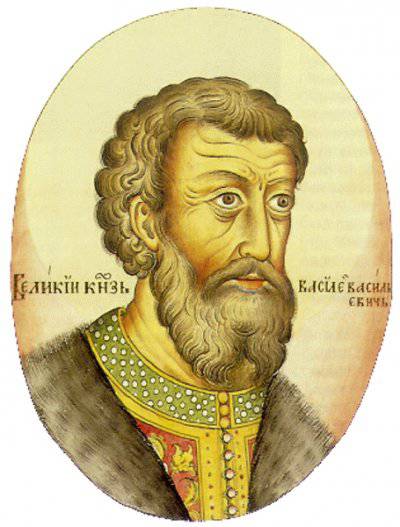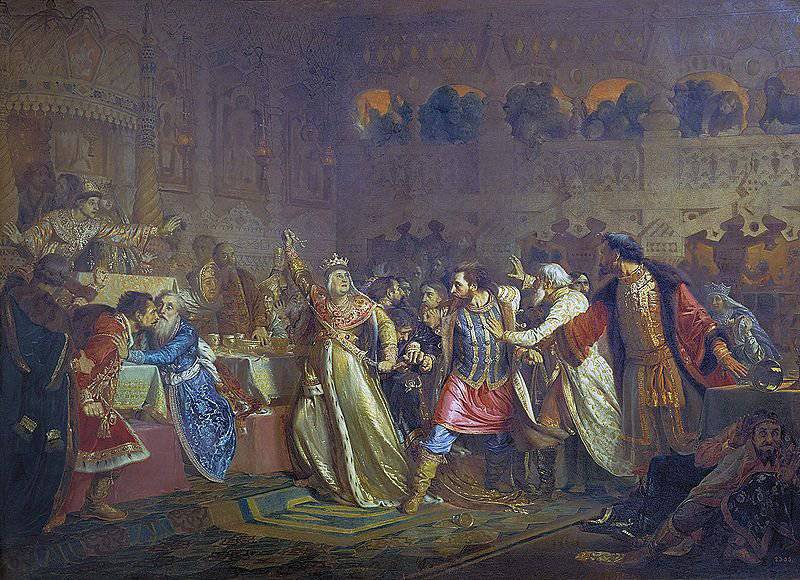Basil the Dark - a bloody oath-breaker or martyr?
 The son of Grand Prince Vasily I Dmitrievich Vasily II of Moscow (Dark) was born in Moscow on March 10 1415.
The son of Grand Prince Vasily I Dmitrievich Vasily II of Moscow (Dark) was born in Moscow on March 10 1415.In the fifteenth century, Russia was in a state of fragmentation. The Grand Duke, although he received a label for reigning from the Golden Horde khan, still could not count on the unconditional subordination of the specific princes. The principle of passing the throne by seniority increasingly came into conflict with the decisions of the Golden Horde. Preference was given to the princes pleasing to the khan, who served him submissively or skillfully created the type of such service. Many of the governors called outright aggression among the population and could not hold power for a long time. The state of the Moscow principality was not so strong as to dictate its will to the whole of Russia, therefore civil strife occurred quite often.
In 1425, the ten-year-old Vasily Vasilyevich, the son of the former grand duke Vasily Dmitrievich, ascended the throne of Moscow. The reign of the young Basil was under serious threat, because it contradicted the customs, as well as the testament of Dmitry Donskoy. As soon as the news of the death of Vasily Dmitrievich overflew the specific tenure, violent feuds began. Uncle Vasily Yury Zvenigorodsky claimed the throne. In addition, Yuri had two adult sons who supported his father in the confrontation. Vasily's mother was the daughter of a strong Lithuanian ruler Vitovt, who took under his protection the principality of a young grandson. To pacify the warlike relatives, the young Vasily, together with his grandfather Vitovt, had to go on a military campaign that ended successfully. As such, the battle was not, because the power of the Lithuanian army and the ratification of Basil surpassed the forces of Yuri and in terms of number and level of combat capability. With Yuri, peace was concluded until the dispute was resolved in the Horde court. The military power of the Lithuanian prince restrained aspirants to the throne of Moscow until his death in 1430.
However, Vitovt himself behaved more like a conqueror than a patron. Without fearing a serious rebuff from the minor grandson, he advanced his troops toward the Russian borders. He was expected a major failure in the capture of the Pskov town of Opochka. Karamzin describes the cunning of besieged citizens, who weakened the bridge over a moat littered with sharp stakes. Many Lithuanian warriors died while trying to capture a stubborn city. However, peace was concluded in favor of Vitovt, and Opochka pledged to pay silver rubles to the Lithuanian prince 1450. Then an experienced commander moved to Novgorod, whose residents thoughtlessly called him a traitor and hawk moth. As a result of the negotiations, Novgorod paid Vitovtu 10 thousands of silver rubles and an additional thousand for the release of prisoners. Simultaneously with the campaigns, the Lithuanian prince communicated with his grandson and daughter, and even invited them to visit, focusing on his disposition and fatherly care.
The position of Prince Vasily was limited by the influence of noble boyars, who, in fact, ruled the principality. Basil, according to contemporaries, was not gifted with either leadership or leadership talents, he had no special intelligence and other abilities of the ruler. The grandson of Vitovt turned out to be a puppet in the hands of the Moscow boyars, so a change of candidacy was not desirable for Muscovites. Sly and deliberate actions of one of the advisers of Prince Dmitry Vsevolzhsky allowed Basil to get a label for reign. The words of the diplomatic boyar that the decision of the Horde Khan should be considered legitimate even if it contradicts the ancient Russian customs of the throne, were decisive in a dispute with Yuri. Basil, in need of the help of an influential and cunning boyar, promised to return to Moscow to marry his daughter when he returned to Moscow, but did not keep his words.

Having received a label for reign, Vasily married Princess Maria Yaroslavovna, at the insistence of his matter Sofia. Offended by such a treacherous deception, Vsevolzhsky immediately left Moscow and joined the opponents of the young grand prince. Yuri spoke immediately and, taking advantage of the prince’s inexperience and the suddenness of his appearance, occupied Moscow. Hastily assembled the army of Basil was defeated, and the Grand Duke himself was forced to flee to Kostroma. The sons of Yuri, nicknamed Kosoy and Shemyak, insistently demanded to deal with their rival, but the influential boyar Morozov at that time stood up for Vasily. Yuri did not dare to stain his honor with the blood of a relative, but he took with Vasily a word not to pretend anymore to a great reign.
Karamyzin explains the hatred of her cousin from Shemyaka and Kosoy by the fact that, at the wedding of the Grand Duke, Sofia Vitovtovna, having forgotten all propriety, tore off Vasily Kosoy from the precious belt that belonged to Dmitry Donskoy. Humiliated by such an act, the brothers were forced to immediately leave the feast and the city.
However, Yuri, leaving Basil alive, did not take into account an important circumstance. Puppet Basil, turned out to be much more attractive to Moscow boyars than an imperious and intelligent winner. As a result, the liberated Basil very quickly received support and gathered impressive forces. The nephew broke his word not to demand the Moscow throne and, with the help of the boyars, forced Yuri to leave the city. Having coped with the main competitor, Vasily faced his two sons, who concealed anger for past insults. Both considered themselves worthy to replace Vasily II on the great throne and were very dangerous rivals.
In 1434, Yuri joined the troops of Vasily Kosoy and Dmitry Shemyaka and defeated the army of Vasily. As a result, the Grand Duke fled to Nizhny Novgorod. However, Yuri suddenly died, so Vasily Kosoy remained in Moscow as a ruler. Such behavior aroused the indignation of the brothers Shemyaka and Krasny, and they turned for help to their former opponent Vasily Vasilyevich. Kosoy was expelled from Moscow and vowed never to claim the throne. In 1435, Vasily Kosoy broke his oath and again moved to Moscow, but was brutally defeated. A year later, Kosoy again went against Basil and tried to defeat him with cunning, but was captured and blinded as a punishment for the oath.
The short peace was broken in 1439 by a Tatar raid led by Ulu-Mohammed, who at one time was not supported by Vasily in confrontation with the Horde princes. Vasily left Moscow and, being safe on the Volga, more than once called for help Dmitry Shemyaka. However, there was no response to the appeals. After Ulu-Mohammed left the city, plundering the neighborhood, Vasily returned and, gathering troops, drove his cousin from his possessions in Novgorod. After a while, Shemyaka returned with a host, but made peace with Vasily.
In 1445, the invasion of the vindictive Tatar Khan Ulu-Mohammed repeated. At this time, Basil after a fierce battle was captured, from which it was possible to redeem only for huge money. The return of the prince was greeted coldly. The additional burden of the ransom fell on the shoulders of the robbed population, which began to show open resentment. Dmitry Shemyaka and a group of conspirators in 1446 year attacked Basil, who was performing a prayer. However, Dmitry Yuryevich did not dare to kill his brother, and only blinded him, recalling the fate of Vasily Kosoy. Already in 1446, Shemyaka, under pressure from the boyars, was forced to release Basil. As soon as the prince got his freedom, a strong coalition formed around him. Vasily was again enthroned, and Dmitry Yuryevich had to flee.
Between the brothers, after a brief struggle, peace was again concluded, however, the enmity did not cease. Shemyaka constantly attempted to gather troops and cause outrage among the population, as a result of which he was persecuted by Vasili and was poisoned in the 1453 year. According to the testimony of contemporaries, since the moment of his blinding Vasily has changed greatly and began to rule wisely and fairly. However, this statement is very doubtful. Most likely, influential boyars ruled on behalf of the prince. Vasily himself was an obedient tool in their hands. Vasily II died of tuberculosis in 1462 after unsuccessful tinder treatment.
During the civil strife the Tatars invaded Russia and plundered the population, burned the cities, took the peasants full. The princes were so absorbed in the internal confrontation that they could not repel the nomads. Russia remained weak and divided for a long time, but the rule of Basil had positive results. The Grand Duchy's power increased significantly after the bloody struggle, and many lands were directly dependent on the Moscow principality. During the reign of Vasily Vasilyevich, the gradual unification of the Russian lands continued.
Information